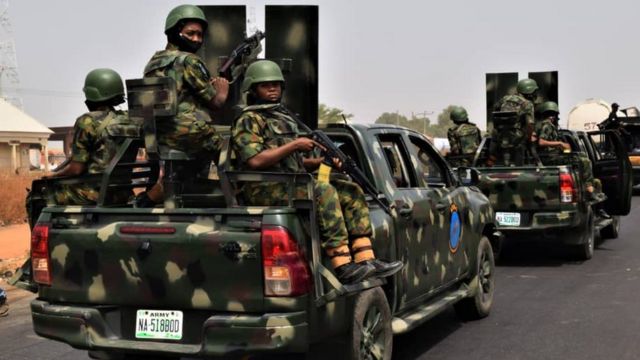The Escalating Threat of Terrorism in Nigeria’s North-East: Foreign Mercenaries and the Need for International Collaboration
The ongoing fight against terrorism in Nigeria’s North-East has taken a concerning turn with the revelation that foreign mercenaries are increasingly involved in supporting and training terrorist groups. Major General Abdulsalam Abubakar, the Theatre Commander of Operation Hadin Kai, disclosed the recent arrest of four Pakistani nationals suspected of arms trafficking and training terrorists, highlighting the growing international dimension of the conflict. This influx of foreign expertise has significantly bolstered the capabilities of terrorist groups like ISWAP and JAS, making them more lethal and tactically advanced.
The involvement of foreign mercenaries has introduced new and sophisticated tactics to the battlefield. Terrorist groups are now utilizing drones for surveillance and attacks, developing advanced improvised explosive devices (IEDs), and employing intricate traps targeting military personnel. These enhanced tactics pose a significant challenge to Nigerian troops and require a more coordinated and robust response. The implication is that the fight is no longer solely against a local insurgency but against a network with international connections, demanding a shift in strategy and a stronger emphasis on international collaboration.
Major General Abubakar emphasized that this growing threat requires a multifaceted approach involving intensified intelligence, surveillance, and reconnaissance (ISR) operations. This enhanced intelligence gathering needs to be coupled with stronger collaboration between Nigeria and its neighboring countries to effectively disrupt the cross-border support networks that sustain these terrorist groups. The porous nature of borders in the region allows for the relatively easy movement of people and materiel, making it critical to strengthen regional security partnerships and implement measures to control cross-border activities.
The commander’s call for national unity is crucial in this context. The threat posed by Boko Haram and ISWAP is not solely against the armed forces, but against the very fabric of Nigerian society. These groups aim to destabilize the nation, sow discord, and disrupt peaceful coexistence. Recognizing this shared threat is essential for galvanizing national support, fostering resilience, and effectively countering the terrorist narrative. A unified front, encompassing not only the military but also civilian populations, is crucial for achieving lasting peace and stability.
Furthermore, acknowledging and appreciating the sacrifices of Nigerian troops operating under harsh conditions is vital for maintaining morale and bolstering their commitment. These soldiers are on the front lines, facing immense risks and enduring challenging circumstances to protect their nation. Their dedication and resilience deserve recognition and support, not just from the government but also from the wider public. Highlighting their heroism and sacrifices serves as a powerful reminder of the stakes involved and reinforces the importance of the collective fight against terrorism.
In conclusion, the fight against terrorism in Nigeria’s North-East is evolving, requiring a more nuanced and comprehensive approach. The involvement of foreign mercenaries introduces a new level of complexity, necessitating enhanced intelligence gathering, stronger regional collaborations, and a renewed emphasis on national unity. Recognizing and supporting the sacrifices of the Nigerian troops who are risking their lives on the front lines is also paramount. This multi-pronged strategy is crucial for effectively countering the growing terrorist threat, protecting Nigerian citizens, and ensuring long-term peace and stability in the region.


